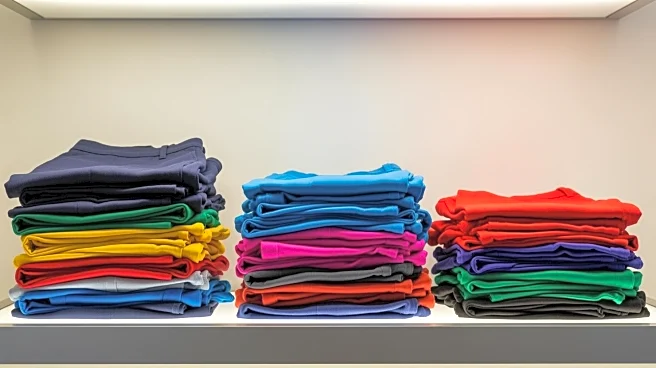What's Happening?
Bangladesh's exports of trousers and shorts have decreased by 9.6% during the period from January to September, according to data from TexPro. The decline is attributed to reduced demand from Europe, which is Bangladesh's largest market, due to slower
retail sales, inflationary pressures, and cautious buying by fashion brands amid geopolitical uncertainties. Exports to Europe totaled $X billion, representing a decrease from the previous year. North America, the second-largest market, also saw a decline in demand, with exports worth $Y billion, reflecting a decrease compared to the same period last year. Despite the decline, Bangladesh has gained slightly in market share as some buyers diversify sourcing from China.
Why It's Important?
The decline in Bangladesh's trouser and shorts exports highlights the impact of global economic challenges on the country's apparel industry. The reduction in demand from major markets like Europe and North America could affect Bangladesh's economic growth and employment in the textile sector, which is a significant contributor to the country's GDP. The shift in sourcing from China to Bangladesh presents an opportunity for the country to capture a larger share of the global apparel market, but it also underscores the need for strategic adaptation to changing consumer preferences and geopolitical dynamics.
What's Next?
Bangladesh may need to explore new markets and diversify its product offerings to mitigate the impact of declining demand from traditional markets. The government and industry stakeholders could focus on enhancing competitiveness through innovation and sustainable practices to attract more buyers. Additionally, monitoring geopolitical developments and consumer trends will be crucial for Bangladesh to navigate the challenges and opportunities in the global apparel industry.
Beyond the Headlines
The decline in exports could prompt discussions on the ethical and environmental implications of fast fashion and the need for more sustainable practices in the apparel industry. As consumers become more conscious of the impact of their purchasing decisions, Bangladesh's textile sector may need to align with global sustainability standards to remain competitive.















